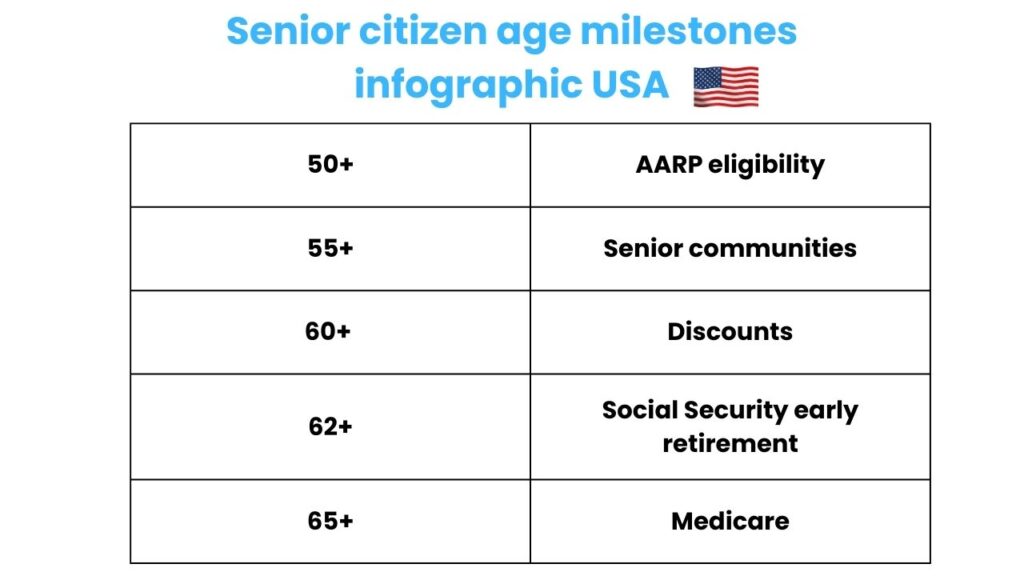What age is considered a senior citizen? Have you ever wondered at what age someone becomes a senior citizen? Some people think it starts at 50, others say 60 or 65. The truth is: there isn’t just one number. It depends on laws, discounts, health programs, and culture.

For example:
- The AARP in the U.S. allows membership at age 50.
- Social Security lets you take early retirement at 62.
- Medicare starts at 65.
So, “senior” is not only about age it’s about milestones and benefits at different stages.
If you’re curious about your own age milestones, you can check with our simple tool:
Easy Age Calculator.
Major Senior Milestones in the U.S.
| Age | Why It Matters | Details & Examples |
|---|---|---|
| 50 | AARP Membership | At 50, you can join AARP and start enjoying travel discounts, insurance offers, and more. |
| 55 | Senior Discounts Begin | Many stores, movie theaters, and restaurants offer senior discounts starting at 55. |
| 59½ | Retirement Accounts | At this age, you can start taking money from retirement accounts like IRA or 401(k) without penalty. |
| 62 | Early Social Security | You can claim Social Security retirement benefits early, though payments will be smaller. |
| 65 | Medicare | Most Americans become eligible for Medicare health insurance at 65. |
| 66–67 | Full Retirement Age | Depending on your birth year, this is when you qualify for full Social Security benefits. |
| 70 | Maximum Social Security | Waiting until 70 gives you the highest monthly Social Security payment. |
| 73 | Required Withdrawals | At this age, you must start taking required minimum distributions (RMDs) from retirement accounts. |

Want to check how much older or younger you are compared to someone else? Try our Age Difference Calculator.
What Age Do You Become a Senior Citizen?
Many people ask, what age do you become a senior citizen? In most countries, the common answer is around 60 to 65 years, but it can change depending on culture, government rules, and retirement benefits.
Senior Citizen Ages Around the World
Being a senior is not the same everywhere. Let’s see how other countries define it:
- United States: Commonly 60–65 (Medicare starts at 65).
- United Kingdom: Seniors usually start at 60, especially for railcards and benefits.
- Canada: Federal programs like Old Age Security start at 65.
- India: The government considers 60+ as senior for pensions and healthcare schemes.
- Australia: Seniors can access the Seniors Card from 60.
- Japan: Traditionally 60, but many benefits begin at 65 due to longer life expectancy.

This shows that “senior” is shaped by culture, laws, and life expectancy.
Benefits of Becoming a Senior
Turning into a senior doesn’t just mean getting older — it opens doors to new opportunities:
- Discounts on travel, dining, and entertainment
- Healthcare programs like Medicare
- Pension and retirement benefits
- Senior housing options
- Community programs and lifelong learning
Myths vs. Facts About Seniors
| Myth | Fact |
|---|---|
| Seniors can’t work | Many seniors continue working or start new businesses. |
| Seniors don’t use technology | More than 70% of adults over 65 use smartphones (Pew Research). |
| Senior = Weak health | Many seniors stay active through walking, yoga, or sports. |
| All seniors retire | Some keep working for fun or financial reasons. |
| Senior = “old” | Senior status is about eligibility, not just aging. |
FAQs Senior Citizen Age
What age is officially senior in the U.S.?
Usually 65, but discounts and programs can start earlier.
Can you retire before 62?
Yes, but you may not qualify for Social Security until 62.
Is 50 considered a senior?
Some groups like AARP consider 50 as senior for membership.
What is the retirement age in Canada?
Federal benefits usually start at 65.
Do all seniors stop working?
No, many seniors continue to work or volunteer.
What’s the difference between early and full retirement age?
Early retirement (62) gives smaller benefits; full retirement (66–67) gives full.
Conclusion
Becoming a senior citizen doesn’t happen on a single birthday. Instead, it’s a journey with milestones at 50, 55, 62, 65, and beyond. Each step brings new benefits, discounts, and opportunities.
Remember: aging is not about slowing down it’s about opening new doors.
Latest Senior Citizen News
“Illinois has raised the minimum age for in-person driver’s license renewal for seniors. Now, drivers aged 79 and above must appear in person, instead of the earlier threshold of 75. Those 87+ will also need to demonstrate safe driving ability. Commercial license holders, however, face mandatory driving tests starting at age 75.” — nbcchicago
“Rep. Jay Hoffman noted that research consistently shows senior drivers are among the safest on the road, suggesting the updated law removes an unnecessary burden while still protecting public safety. Family members can also submit concerns if they believe a loved one is no longer able to drive safely.” — nbcchicago
“National Senior Citizen’s Day, observed on August 21, remains a special time to honor seniors for their lifelong service, wisdom, and dedication. The celebration, first recognized by President Ronald Reagan in 1988, highlights key issues facing older adults such as health, independence, and elder care.” — waynedalenews
“Communities like Fort Wayne mark the occasion with year-round senior activities — from the Senior Games and Active Aging Week to programs at the Community Center. These efforts aim to keep older adults active, socially connected, and appreciated for their contributions.” — waynedalenews